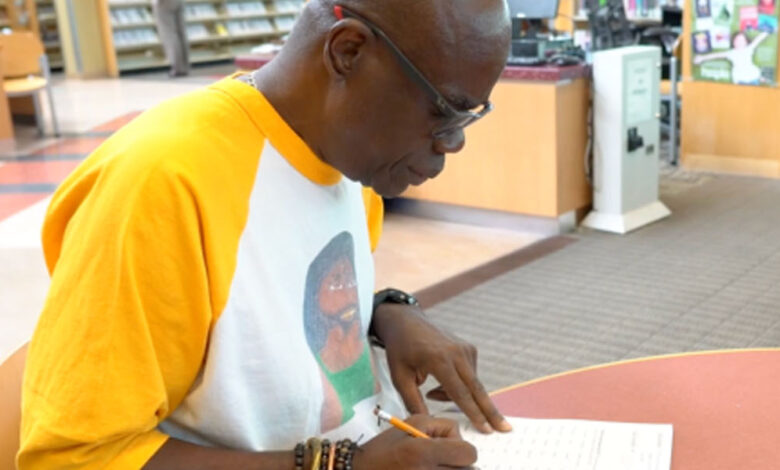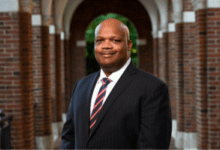
Boosting Adult Literacy Rates in the Black Community
By Maya Pottiger | Word In Black
(WIB) – While at the library making copies one day in 2018, Gregory Hill looked up and saw a sign that read “Adult Literacy Center: Read, Learn Help.” At 65-years-old, he thought his chances of fulfilling his lifelong dream of learning to read and write were “pretty slim.”
That all changed that day thanks to a program run by the Los Angeles Public Library. He was paired with a tutor — a volunteer attending nursing school — who helped him see his dreams come true.
“It opened up doors that I thought would never be open at the age of 65 and the challenges that I’ve gone through in my life,” an emotional Hill explained in a video about the program’s impact.
Hill was one of the 43 million adults in the United States who struggled with adult literacy — people who have aged out of the K-12 system but cannot read, write, or do math above a third-grade level. It’s a problem that costs our economy trillions of dollars every year, and makes it more difficult for people to live healthy, fulfilled lives — but as the library’s program shows, it doesn’t have to be this way.
Literacy Among Black Adults
Up-to-date adult literacy data, especially broken down into race and ethnicity demographics, is hard to come by. A 2019 report from the National Center for Education Statistics, which cited data from 2012 and 2014, found that 23% of Black adults in the country were considered to be low literacy, compared to 35% of white adults and 34% of Hispanic adults.
For Black adults, issues with literacy have come about in a variety of ways. We can trace the problem back to Jim Crow Black Education Research Collective at Teachers College, Columbia University.
Experts like Grant say understanding why Black people have lower literacy rates deserves more attention.
He echoes what scholars and Critical Race theorists have been saying: “We have to address issues of racism in this country, and how it embeds itself in the policies and practices that impact the kinds of education that people receive.”
While the school-to-prison pipeline and how educators push Black students out of school is an openly discussed issue, domestic responsibilities also play a factor — like students needing to stay home to help care for family members.
We have to address issues of racism in this country, and how it embeds itself in the policies and practices that impact the kinds of education that people receive.
- BRETT GRANT, POSTDOCTORAL FELLOW AT THE BLACK EDUCATION RESEARCH COLLECTIVE
“It’s a different way of being pulled out of the educational system,” says Kelly Tyler, the managing librarian for the Office of Education and Literacy for the Los Angeles Public Library.
If you’re someone who has never struggled with your education, it might not occur to you that this isn’t everybody’s experience, Tyler says. People who don’t earn a high school diploma have higher unemployment rates and lower earnings, and they are also more likely to be incarcerated.
These problems show up, says Tyler, when it comes to supporting adults who have limited health literacy because they’re more likely to use emergency services or be hospitalized. In terms of the COVID-19 pandemic, it has been difficult to get information to people with lower reading levels or comprehension, especially concerning the constantly changing vaccine and mask information.
When it comes to any myths or misunderstandings surrounding adult literacy, or barriers to lowering the rates, Grant says “it’s really complicated” and full of nuance. Of course a lack of positive representation in the media is an issue, along with the stereotype of “you sound white,” but it all comes down to the environment in which people grew up and how they were socialized.
“We need to push back against these conceptions,” Grant says.
Grant also says it’s important to expand the understanding of adult literacy beyond reading, writing, and math. The mainstream definition often leaves out ecological literacy, which examines who we build relationships, and environmental and health literacies.
“It’s critical in terms of the agency that people have in terms of working with each other to develop these literacies in these different areas,” Grant says, adding that these should also be considered “foundational pieces.”
The Costs of Adult Literacy
Looking holistically at the components of adult literacy — reading, writing, math, relationship building — paints a bigger picture of the skills that could be missing. Unsurprisingly, this lack of skills has an impact on the economy.
A 2020 Gallup study found that 130 million people — or 54% of people ages 16-74 — were not proficient in literacy. This prevents as much as $2.2 trillion from being earned in annual income every year.
“Almost every social and economic issue is inextricably linked to low literacy,” Michele Diecuch, the senior director of programs at ProLiteracy, told Word In Black in a statement. “When adults learn how to read better, do math, and increase digital literacy skills, they have the power to get out of poverty, find employment, and lower health care costs.”
Almost every social and economic issue is inextricably linked to low literacy.
MICHELE DIECUCH, SENIOR DIRECTOR OF PROGRAMS AT PROLITERACY
It’s the way the economic system was designed, says Dr. Tony Carnevale, the director of the Georgetown University Center on Education and the Workforce. He cited PIAAC polls, an international survey that measures adult skills, saying that the U.S. always ranks “somewhere towards the middle or the bottom among modern industrialized nations.”
“The American economy operates with brute efficiency,” Carnevale says. “So that we pretty much ensure we only invest in people who’ve already been invested in, which is to say advantaged youths.”
One way states are trying to fix this, Carnevale says, is by bringing vocational training or apprenticeships back to high schools — creating more of a connection between high school, college, and a person’s career.
“It’s a systemic problem,” Carnevale says. “The education system kind of runs society now.”
Libraries Are Key Resources for Adult Literacy Programs
Thanks to millennials, public libraries are having a resurgence. But these spaces offer programming and resources for a variety of ages and needs, including literacy programs.
The Los Angeles Public Library has two key resources that are helping area adults: its Career Online High School and an adult literacy program. The two programs have helped around 1,000 people improve their literacy since 2014.
“Our program tries to be really learner-driven or learner-centered,” Tyler says, meaning students have the opportunity to take an active role in their education. “Each learner has different goals that they’re trying to meet, so it really depends on the individual learner how we try to work with them and support them to accomplish those goals.”
The online high school is free to LA residents, and it comes with a bunch of perks, like virtual classes, a personal academic coach, and career training. It ends, of course, with a diploma. It’s graduated more than 500 students.
“We try to provide an environment that doesn’t feel as much like a traditional school because we know that there has been a lot of educational trauma for a lot of students who have struggled in school settings,” Tyler says.
You Can Help Adults in Your Community Learn to Read
Volunteers are needed across the country to help adults learn how to read, especially volunteers “who look like our communities,” Tyler says.
“It’s wonderful to have volunteers and learners who are different from each other,” Tyler says. “It’s also really helpful to have people from communities serving people from the same community because there’s so much that can be in common there. A big part of our program is you’re not just teaching how to read, it’s also a mentorship type of relationship.”
One of the biggest misconceptions is that you have to be an English major or an expert in grammar. Really, all you need is a love of reading. The National Literacy Directory can provide local opportunities both for people who want to volunteer and those seeking help.
“It’s never ever too late to start to learn to read, write, and arithmetic,” says Hill, the LAPL student. “If I can do it at 65, I know that they can.”
Support for this Sacramento OBSERVER article was provided to Word In Black (WIB) by the Chan Zuckerberg Initiative. WIB is a collaborative of 10 Black-owned media that includes print and digital partners.
The post Boosting Adult Literacy Rates in the Black Community appeared first on The Sacramento Observer.










